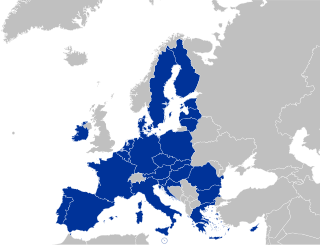| |||||
| Decades: | |||||
|---|---|---|---|---|---|
| See also: | |||||
Events in the year 2017 in the European Union .
| |||||
| Decades: | |||||
|---|---|---|---|---|---|
| See also: | |||||
Events in the year 2017 in the European Union .

The European Council is a collegiate body that defines the overall political direction and priorities of the European Union. The European Council is part of the executive of the European Union (EU), beside the European Commission. It is composed of the heads of state or government of the EU member states, the President of the European Council, and the President of the European Commission. The High Representative of the Union for Foreign Affairs and Security Policy also takes part in its meetings.

The euro area, commonly called the eurozone (EZ), is a currency union of 20 member states of the European Union (EU) that have adopted the euro (€) as their primary currency and sole legal tender, and have thus fully implemented EMU policies.

The presidency of the Council of the European Union is responsible for the functioning of the Council of the European Union, which is the co-legislator of the EU legislature alongside the European Parliament. It rotates among the member states of the EU every six months. The presidency is not an individual, but rather the position is held by a national government. It is sometimes incorrectly referred to as the "president of the European Union". The presidency's function is to chair meetings of the council, determine its agendas, set a work program and facilitate dialogue both at Council meetings and with other EU institutions. The presidency is currently, as of January 2024, held by Belgium.

The European Union (EU) has expanded a number of times throughout its history by way of the accession of new member states to the Union. To join the EU, a state needs to fulfil economic and political conditions called the Copenhagen criteria, which require a stable democratic government that respects the rule of law, and its corresponding freedoms and institutions. According to the Maastricht Treaty, each current member state and the European Parliament must agree to any enlargement. The process of enlargement is sometimes referred to as European integration. This term is also used to refer to the intensification of co-operation between EU member states as national governments allow for the gradual harmonisation of national laws.

The president of the European Council is the person presiding over and driving forward the work of the European Council on the world stage. This institution comprises the college of heads of state or government of EU member states as well as the president of the European Commission, and provides political direction to the European Union (EU).

Jean-Claude Juncker is a Luxembourgish politician who served as the 23rd prime minister of Luxembourg from 1995 to 2013 and 12th president of the European Commission from 2014 to 2019. He also served as Finance Minister from 1989 to 2009 and President of the Eurogroup from 2005 to 2013.

Margrethe Vestager is a Danish politician currently serving as Executive Vice President of the European Commission for A Europe Fit for the Digital Age since December 2019 and European Commissioner for Competition since 2014. Vestager is a member of the Danish Social Liberal Party, and of the Alliance of Liberals and Democrats for Europe Party (ALDE) on the European level.
Pan-European liberalism has been a political force since the establishment of the European Liberal Democrat and Reform Party in 1976.

The euro came into existence on 1 January 1999, although it had been a goal of the European Union (EU) and its predecessors since the 1960s. After tough negotiations, the Maastricht Treaty entered into force in 1993 with the goal of creating an economic and monetary union (EMU) by 1999 for all EU states except the UK and Denmark.

The 2nd European Union - African Union Summit, which was held on 8 December – 9 December 2007 in Lisbon, Portugal, was the second summit between heads of state and government from EU and Africa. It was hosted by Portugal, the holder of the EU's rotating presidency. During the summit, the "Joint EU-Africa Strategy", the "Action Plan" and the "Lisbon Declaration" were adopted.
Events from the year 2003 in the European Union.
Events in the year 2008 in the European Union.
Events from the year 1998 in the European Union.

The largest enlargement of the European Union (EU), in terms of number of states and population, took place on 1 May 2004.

The Union for the Mediterranean is an intergovernmental organization of 43 member states from Europe and the Mediterranean Basin: the 27 EU member states and 16 Mediterranean partner countries from North Africa, Western Asia and Southern Europe. It was founded on 13 July 2008 at the Paris Summit for the Mediterranean, with an aim of reinforcing the Euro-Mediterranean Partnership (Euromed) that was set up in 1995 as the Barcelona Process. Its general secretariat is located in Barcelona, Catalonia, Spain.

The Permanent Structured Cooperation (PESCO) is the part of the European Union's (EU) security and defence policy (CSDP) in which 26 of the 27 national armed forces pursue structural integration. Based on Article 42.6 and Protocol 10 of the Treaty on European Union, introduced by the Treaty of Lisbon in 2009, PESCO was first initiated in 2017. The initial integration within the PESCO format is a number of projects which launched in 2018.
Events in the year 2014 in the European Union.
Events in the year 2013 in the European Union.

EU Med, EuroMed 9, or MED9, which is also referred to as "Club Med" and "Med Group", is an alliance of nine Mediterranean and Southern European Union member states: Croatia, Cyprus, France, Greece, Italy, Malta, Portugal, Slovenia and Spain. They are part of the Mediterranean Basin. All nine countries are states of the European Union, part of the eurozone, and all except Cyprus are part of the unbounded Schengen Area.